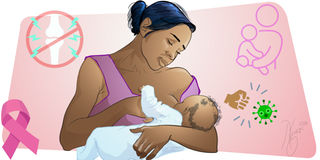Premium
When breastfeeding affects a couple’s sex life

Women who breastfeed have a reduced incidence of breast cancer.
It has been three years now. Agnes walked into the clinic with her husband carrying her new bundle of joy – Baby Barack. Her story crossed my mind as I reflected on October, which is breast cancer awareness month.
“We are not sick, we just wanted your opinion on an important decision we have made,” declared Agnes as she took her seat, positioning the baby delicately on her lap as her husband, John, wiped a tinge of sweat from her face and positioned a small pillow he was carrying behind her back on the seat.
“Are you comfortable, sweetie?” John asked with genuine concern, pecking her cheeks. This couple was truly in love. They had been married for 12 months. Baby Barack was their first and they were just beginning to come to terms with the responsibilities of parenthood. For the few days they had been with the baby at home following discharge from hospital, they made phone calls two to three times a day asking questions about the baby, as well as Agnes’ recovery.
“So tell me about the important decision you have made Agnes to stop your job and care for the baby?” I asked to draw their attention back to the discussion.
“Well, not really,” John answered. “It is about bolingo. We don’t want the baby to interfere.”
“Bolingo? That sounds Congolese, and I am not sure what it means,” I said, looking at both of them in the face.
“Doctor, he means that Barack is interfering with our sex life,” Agnes threw the bombshell. “And we have made some decisions to stop him.”
The story was that the couple had tried to fondle and caress in the few days after coming from the hospital. Agnes had a lot of milk, and anytime John got close, he was washed in it. They both felt bad.
“And if anything, continued breastfeeding is going to make her breasts sag, and that is not what we want,” said John.
The couple had therefore decided to stop breastfeeding.
“You can’t be serious!” I exclaimed spontaneously.
For healthy growth, it is recommended that mothers commence breastfeeding within one hour of delivery and that they give nothing else, not even water, to the baby until six months of age. Weaning starts in the sixth month but goes hand in hand with breastfeeding until the baby is two years old. Mothers can stop breastfeeding at two years but are free to continue if they so wish.
For working mothers, the recommendation is that they express their breast milk and leave it at home with the nanny to be given to the baby in her absence. Going back to work should therefore not deprive the baby of breast milk. In fact, good employers now have breastfeeding corners in the workplace, and mothers can take breastfeeding breaks.
Recommendations for breastfeeding are based on solid scientific evidence that shows that breast milk, in addition to providing nutrients for growth, helps children fight common infections, reduces allergies in all stages of life, and helps mother and baby to bond, which is important in the social growth of the baby.
Breastfed children also have lower incidences of obesity and diabetes later in life. Breastfeeding therefore not only gives the baby a good start in life but also determines the future well-being and productivity of individuals.
The mother too has benefits. Women who breastfeed have a reduced incidence of breast cancer, a leading cause of death in women. Further, depression is less common in women who have breastfed. Brittle bones, also called osteoporosis, which is a common cause of fractures in old age, are more common in women who have not breastfed.
“But doctor what about bolingo, or don’t you think it is important?” John asked, appearing disappointed.
The importance of sex and intimacy in marriage cannot be overemphasised. It is not only healthy for the couple but also benefits and promotes good growth of the baby. Couples must, however, learn ways of enjoying romance that do not interfere with the well-being of the baby and the mother.
One way to handle the flow of milk in intimacy is to put on a padded bra. The milk gets absorbed into the pad and the couple can have a good time.
“Sir but the breasts will sag if Agnes breastfeeds,” insisted John.
Well, with or without breastfeeding, the breasts will sag. It is a growth and age issue. Tissues loosen as age catches up with women and the breasts just sag. In fact, depending on a woman’s breast size, the sagging can happen very early in life. Men who love their wives look beyond the sagging of breasts.
“John I think we can do with breastfeeding, I am ready to spice up things for you in other ways so that we protect the health of Barack,” Agnes said, reaching for John’s hand.
“And just make sure you give yourself time to recover before active, penetrative sex,” I added. It is recommended that women wait for six weeks after delivery before resuming sex. This is important for the recovery of tissues around the birth canal that suffer trauma during delivery.





